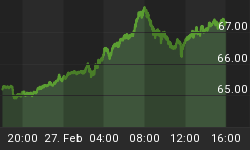Below is an extract from a commentary originally posted at www.speculative-investor.com on 17th April 2006.
Over the past year the gold price has risen strongly in terms of all major currencies. But why? Is it because the markets have become far more worried about inflation? Or, perhaps, because gold is being re-monetised in the eyes of investors, that is, because gold's monetary premium is increasing?
As far as we can tell, the rise in the gold price has very little to do with either a pronounced increase in inflation fears or the re-monetisation of the yellow metal in the eyes of investors. For one thing, inflation expectations remain low. We know that this is the case because:
a) The current difference between the yield on a 10-year T-Note and the yield on an inflation-indexed 10-year T-Note -- a representation of what the market expects the CPI to average over the coming 10 years -- is 2.57%. This is not just low; it is almost exactly the same as it was at this time last year.
b) Although bonds have been weak over the past 9 months or so, yield curves throughout the world are presently flat. If you can get roughly the same yield on a 2-year bond as you can get on a 10-year bond then there obviously isn't much inflation risk priced into the longer-dated bond. Rather than being a reaction to burgeoning inflation fears, it looks like the recent weakness in bonds has more to do with central bank rate hikes and the growing recognition of Japan's recovery.
c) Price/earnings ratios are at elevated levels in stock markets throughout the world (there's a strong inverse correlation between stock market valuations and long-term inflation expectations).
d) Although it has done well relative to most fiat currencies, gold has been very weak relative to almost every other metal over the past year. In fact, the following chart shows that the gold/GYX ratio (gold relative to a basket of industrial metals) has just hit its lowest level in more than 5 years and is close to the secular bear market low reached during 1999-2000.

That gold has been so weak relative to cyclical metals tells us three important things. First, that gold's monetary premium has actually SHRUNK over the past year and is now as low as it was in Q4 2000. Second, that most people believe the commodity rally to have almost everything to do with real economic expansion (the China/India growth story in particular) and almost nothing to do with inflation. Third, that the best part of gold's bull market lies in the future because right now hardly anyone perceives a serious inflation problem.
To expand on the third of the above points, bull markets are all about converting non-believers in the bullish fundamentals into believers; and they only end after taxi drivers, hair dressers, shoeshine boys, butchers, bakers, and candlestick makers have come to understand WHY the price has risen and have come to strongly believe that the price will continue to rise. The fact that so few people currently perceive a reason to own gold other than as a general commodity/liquidity play means that we are still nowhere near a major top in terms of either price or time.















